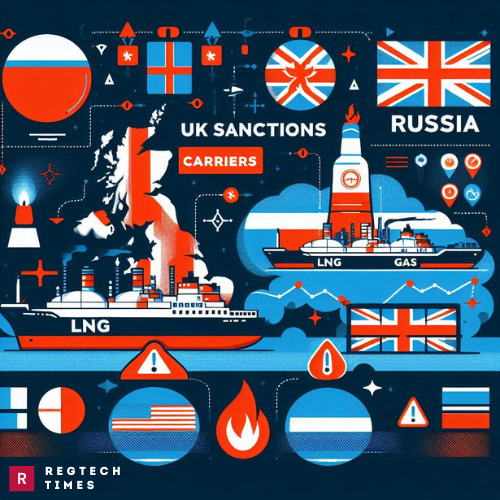In a significant move reflecting the escalating geopolitical tensions surrounding Russia’s actions in Ukraine, the UK sanctions have been announced against five liquefied natural gas (LNG) carriers linked to Russia’s Arctic LNG 2 project. This decision marks a pivotal moment in the UK’s strategy to curtail Russian energy revenues, which are critical for financing military operations. The sanctions closely mirror recent actions taken by the United States, highlighting the coordinated efforts of Western allies to diminish Russia’s energy export capabilities.
Details of the Sanctions: UK Sanctions on LNG Carriers
The UK sanctions were announced on Thursday and include four LNG carriers that had already been designated by the US in the past two months, demonstrating a united front against Russian energy initiatives. The vessels sanctioned are the Pioneer (IMO: 9256602), Asya Energy (IMO: 9216298), Nova Energy (IMO: 9324277), and North Sky (IMO: 9953523). Additionally, the UK targeted two shipping companies—Ocean Speedstar Solutions and White Fox Ship Management—that are associated with these carriers.
Among the sanctioned vessels is the Barbados-flagged La Perouse (IMO: 9849887), which had recently changed its name and management from a company linked to Russia’s Sovcomflot. This change, alongside a shift in flag and ownership to a Seychelles-based company, underscores the adaptive strategies employed by Russian entities in response to international sanctions. While La Perouse had evaded US sanctions until now, its inclusion in the UK’s measures signals intensified scrutiny of vessels involved in the Arctic LNG 2 project.
The Impact of UK Sanctions on Russia’s Energy Ambitions
Arctic LNG 2 is touted as Russia’s flagship energy project, aimed at expanding the country’s LNG production capabilities. Despite beginning production in December, the project has faced significant hurdles in exporting its first cargo due to the impact of Western sanctions, which have deterred foreign investment and halted the delivery of specialized, ice-ready LNG carriers. The recent export of a third cargo from this heavily sanctioned project onto a floating storage unit highlights the challenges that Western sanctions have posed for Moscow’s ambitions to increase its LNG market share.
U.S. Sanctions Syrian Shipping Tycoon and Chinese Firms in Crackdown on Iran and Hezbollah
The UK government’s statement on the sanctions emphasizes the need to “bear down on Russia’s attempts to bolster its future energy revenues,” which are deemed essential for financing the ongoing conflict in Ukraine. As Western allies coordinate their sanctions efforts, the implications for Russia’s energy sector could be profound. This unified approach is designed to undermine the Kremlin’s ability to generate revenue from its natural resources, a key pillar of its economy.
Future Enforcement and Global Implications of UK Sanctions
In a broader context, recent discussions among EU member states and international partners have focused on enhancing the enforcement of price caps on Russian oil and refined products. The Sanctions Coordinators Forum has emerged as a platform for dialogue among a dozen countries, aiming to tighten controls on the so-called “shadow fleet” of tankers that are used to bypass sanctions. These efforts reflect a growing recognition of the need for relentless enforcement to curb Russian oil revenues, which continue to finance its military operations.
EU sanctions envoy David O’Sullivan recently acknowledged the tangible impact of these measures, citing reduced trade flows and increased compliance among operators as evidence of their effectiveness. However, he cautioned that more needs to be done to ensure sustained pressure on Russia and its energy exports.
The UK sanctions on LNG carriers mark a significant escalation in its response to the ongoing conflict in Ukraine. By targeting specific vessels and companies involved in the Arctic LNG 2 project, the UK aims to send a strong message to Russia about the consequences of its actions. These measures not only aim to limit Russia’s current energy capabilities but also seek to hinder its long-term plans for expanding LNG production and export capacity.
As the situation continues to evolve, the ramifications of these sanctions will be closely monitored by both Russia and the international community. The UK’s proactive stance underscores the importance of energy security in the face of geopolitical challenges, highlighting the interconnectedness of energy markets and international relations. With Western nations increasingly aligned in their efforts to constrain Russian energy exports, the coming months will be crucial in determining the effectiveness of these UK sanctions in reshaping the global energy landscape.


